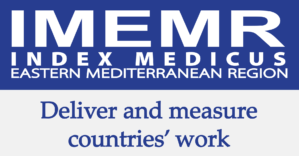Knowledge, Attitude, and Practice Regarding Disaster Preparedness among Undergraduate Nursing Students
DOI:
https://doi.org/10.53685/jshmdc.v4i2.144Abstract
Background: Disaster is "the sudden onset of an event that disrupts regular living conditions and causes severe suffering, increasing the impact of community maladaptation. Nurses’ knowledge and understanding of disaster management can play an important role in reducing casualties and complications.
Objective: This study aimed to determine the level of knowledge, attitude, and practice about disaster preparedness and its association with demographic variables among undergraduate nursing students.
Methods: The cross-sectional descriptive study was conducted at two institutes, Ziauddin University Faculty of Nursing and Midwifery, Karachi, and Benazir College of Nursing, Shaheed Mohtarma Benazir Bhutto Medical University, Larkana, Pakistan. This study was conducted among 175 nursing students of semester-II and IV from July 2021 to March 2022; the sample size was determined by using OpenEpi version 3.0. The target population was approached by a non-probability consecutive sampling method. A pretested, validated, and self-administered questionnaire was used for data collection. The Statistical Package for Social Sciences version 22, independent t-test, and ANOVA were used for inferential analysis.
Results: Most (63.43%) of the participant’s age was between 21-30 years, majority of them were females (58.29%) with 1–10 years of clinical experience (84.57%). The highest mean and standard deviation were identified among 31–40 years of age; the variables are knowledge, attitude, and practice (6.32±2.5), (5.7±2.05), and (6.37±2.2), respectively. The clinical practice was found to be significant with a p-value < 0.05.
Conclusion: It is concluded that undergraduate nursing students elicit a moderate level of knowledge, attitude, and practice regarding disaster preparedness. Knowledge, attitude, and practice can be improved by organizing periodic training sessions at the undergraduate level.
References
Ghezeljeh TN, Aliha JM, Haghani H, Javadi N. Effect of education using the virtual social network on the knowledge and attitude of emergency nurses of disaster preparedness: A quasi-experiment study. Nurse Educ Today.2019; 73:88-93.doi:10.1016/j.nedt .2018.12.001 DOI: https://doi.org/10.1016/j.nedt.2018.12.001
Khilji FUR, Raziq A, Shoaib M, Baloch NS, Raza S, Iqbal Z, et al. “Expecting the Unexpected:” Nurses' response and preparedness of terrorism-related disaster events in Quetta city, Pakistan. Front Public Health. 2021; 9:695143. doi:10.3389/fpubh.2021.695 143 DOI: https://doi.org/10.3389/fpubh.2021.695143
Khalil NS, Atia AS, Moustafa MF, Soliman HT. Emergency nurses’ knowledge and practice regarding the preparedness of disaster management at a university hospital, Egypt. Nurs. Healthc. Int. J. 2019; 3: 1-2. doi: 10.23880/nhij-16000192 DOI: https://doi.org/10.23880/NHIJ-16000192
Mirzaei S, Eftekhari A, Sadeghian MR, Kazemi S, Nadjarzadeh A. The effect of disaster management training program on knowledge, attitude, and practice of hospital staffs in natural disasters. J. Disaster Res. 2020;2(1):9-16. doi:10.18502/jder.v2i1.566 DOI: https://doi.org/10.18502/jder.v2i1.566
Nofal A, Alfayyad I, Khan A, Al Aseri Z, Abu-Shaheen A. Knowledge, attitudes, and practices of emergency department staff towards disaster and emergency preparedness at tertiary health care hospital in central Saudi Arabia. Saudi Med J. 2018; 39(11): 1123.doi:10.15537/smj.2018.11.23026 DOI: https://doi.org/10.15537/smj.2018.11.23026
Sanderson D, Sharma A. Resilience: Saving lives today, investing for tomorrow. World Disasters Report; IFRC: Geneva, Switzerland. 2016.
Alzahrani F, Kyratsis Y. Emergency nurse disaster preparedness during mass gatherings: a cross-sectional survey of emergency nurses' perceptions in hospitals in Mecca, Saudi Arabia. BMJ Open. 2017; 7(4): e013563.doi:10.1136/bmjopen-2016-013563 DOI: https://doi.org/10.1136/bmjopen-2016-013563
Tahir, M. Country Report of Pakistan. 2015. Cited September 20, 2022. https://www.adrc.asia/countryreport/PAK/2015/PAK_CR2015A
Kakar AH, Siddique A. Gandhara, Pakistan Faces Unprecedented Healthcare Crisis Amid Mounting Coronavirus Infections. Cited June 19, 2020 https://gandhara.rferl.org/a/pakistan-faces-unprecedented-healthcare-crisis-amid-mounting-coronavirus-infections/30679490.html
Sattar SA, Zahra NA, Mohamed WM. The effect of an educational intervention about disaster preparedness on knowledge and attitudes of technical nursing institute intern-nurse students. Am J Nurs. 2018; 7(6): 287-295. doi:10.11648/j.ajns.20180706. 22
Gillani AH, Izham M, Ibrahim M, Akbar J. Evaluation of disaster medicine preparedness among healthcare profession students. A Cross-Sectional Study in Pakistan Int J Environ Res Public Health. 2020; 17(6):1-14doi:10.3390/ijerp h17062027 DOI: https://doi.org/10.3390/ijerph17062027
Yan YE, Turale S, Stone T, Petrini M. Disaster nursing skills, knowledge and attitudes required in earthquake relief: Implications for nursing education. International nursing review. 2015; 62(3):351-359. doi:10.1111/inr.12175 DOI: https://doi.org/10.1111/inr.12175
UNISDR terminology on Disaster Risk Reduction. Source: 2009. Source: United Nations Office for Disaster Risk Reduction. https://www.undrr.org/publication/2009-unisdr-terminology-disaster-risk-reduction
Bahrami P, Ardalan A, Nejati A, Ostadtaghizadeh A, Yari A. Factors affecting the effectiveness of hospital incident command system; Findings from a systematic review. Bull Emerg Trauma. 2020; 8(2):62-76.doi:10.30476/BEAT.2020.46445
Chuang S, Woods DD, Ting HW, Cook RI, Hsu JC. Coping with a mass casualty: insights into a hospital’s emergency response and adaptations after the Formosa Fun Coast dust explosion. Disaster medicine and public health preparedness. 2020; 14(4): 467-476. doi: 10.1017/dmp.2019.69 DOI: https://doi.org/10.1017/dmp.2019.69
Holmgren C, Jussèn S, Hagiwara MA, Rådestad M. Charge nurses’ perceived experience in managing daily work and major incidents in emergency departments: A qualitative study. Australas.Emerg Care. 2022; 25(4): 296-301.doi:10.1016/j.auec. 2022.02.003 DOI: https://doi.org/10.1016/j.auec.2022.02.003
Veenema TG. Disaster nursing and emergency preparedness. Springer Publishing Company; 2018.
World Health Organization I. ICN framework of disaster nursing competencies. Geneva: World Health Organization. 2009.
Ghouri A, Badil, Raja, Ali SZ, Khan AR. Effectiveness of educational training related to disaster preparedness among the nursing students. Ann Jinnah Sindh Med Uni. 2020; 6(2):50-53.doi: 10.46663/ajsmu.v6i2.50-53 DOI: https://doi.org/10.46663/ajsmu.v6i2.50-53
Lian P, Zhuo Z, Qi Y, Xu D, Deng X. The impacts of training on farmers’ preparedness behaviors of earthquake disaster—evidence from earthquake-prone settlements in rural China. Agriculture. 2021; 11(8): 726.doi:10.3390/agriculture 11080726 DOI: https://doi.org/10.3390/agriculture11080726
Devi AW, Sharma D. Awareness on earthquake preparedness: A key to safe life Int. J. Nurs. Pract. 2015;2(2):1-6.
Habte A, Addisie A, Azazh A. Assessment of knowledge, attitude and practice of disaster preparedness among TikurAnbessa specialized hospital health care workers, Addis Ababa, Ethiopia. American J. Nurs. Sci. 2018; 7(1): 39-48.doi: 10.11648/j.ajns.20180701.15 DOI: https://doi.org/10.11648/j.ajns.20180701.15
Senthilkumar T. Knowledge and attitude regarding crisis management of natural disaster among people of the selected rural community in Kannur District Kerala. Medicon Medical Sciences. 2022; 2: 09-14. doi: 10.55162/MCMS.02.01924.
Africa PN. Knowledge, attitudes and practices of health care workers regarding hepatitis B vaccination, in the Ekurhuleni Metro, Gauteng Province (Doctoral dissertation, University of Limpopo (Medunsa Campus).
Yin H, He H, Arbon P, Zhu J, Tan J, Zhang L. Optimal qualifications, staffing and scope of practice for first responder nurses in disaster. J. Clin. Nurs. 2012; 21(1‐2): 264-271. doi:10.1111/j.1365-2702. 2011.03790.x DOI: https://doi.org/10.1111/j.1365-2702.2011.03790.x
Downloads
Published
How to Cite
Issue
Section
License
Copyright (c) 2023 Aftab Ghouri, Raja, Badil

This work is licensed under a Creative Commons Attribution-NonCommercial 4.0 International License.
You are free to:
- Share — copy and redistribute the material in any medium or format
- Adapt — remix, transform, and build upon the material
- The licensor cannot revoke these freedoms as long as you follow the license terms.
Under the following terms:
-
Attribution — You must give appropriate credit, provide a link to the license, and indicate if changes were made. You may do so in any reasonable manner, but not in any way that suggests the licensor endorses you or your use.
-
Non Commercial — You may not use the material for commercial purposes.
-
No additional restrictions — You may not apply legal terms or technological measures that legally restrict others from doing anything the license permits.





















